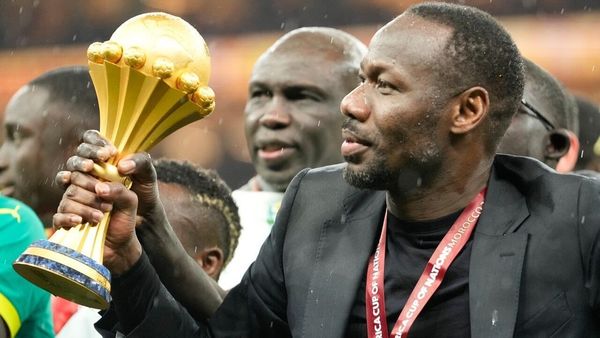
Patrick Vieira gone! Antonio Conte gone! Brendan Rodgers gone! Graham Potter gone! More managers have left Premier League clubs in the past four weeks than in the entire 2005-06, 2003-04 or 1995-96 seasons. The past month has not quite matched the chaos of November 1994, when Ossie Ardiles, Mike Walker, Ron Atkinson, Gerry Francis and Brian Little left their jobs, but for managers this has been the most turbulent season in Premier League history, with 13 leaving mid‑campaign.
It may not be over yet. Last Sunday was the first time since 4 October 2015 that two Premier League managers departed on the same day (Rodgers was one of the pair then as well, which is perhaps something for other managers to think about next time the brink is near). Only once before, in 2002-03, have four managers been sacked (or “left by mutual consent”) after the end of February and there is a clear possibility David Moyes or, despite assurances to the contrary, Steve Cooper becomes a fifth.
So what lies behind the bloodletting? To an extent, Alex Ferguson was probably right in 2007 when he observed that the spirit of reality TV shows has infected all life, that voting somebody out at the end of each week feels a right, perhaps an obligation. And the news cycle has speeded up: everything happens faster; even prime ministers are now ousted as quickly as Brian Clough once was at Leeds. But there has also been a fundamental change to the sport itself.
Football roughly falls into three eras. There was the age of the player, which endured from the beginnings of the game through to the mid-1950s. There were exceptions – Herbert Chapman at Arsenal and Huddersfield most notably – but for the first nine decades or so of football’s existence the person who defined a club was the dominant player.
Sunderland in the 1930s were the team of their captain, Raich Carter; in the years immediately after the second world war, Liverpool were known as “Liddellpool” because of the influence of the forward Billy Liddell.
Then came the age of the manager. In the second half of the 20th century, and as the default W-M formation yielded to more sophisticated tactical variations, the growth of broadcast media meant it was necessary for somebody to represent the club to the listening or watching public. A club’s personality came to reside in the boss who, ideally, would be good for a quip or a telling line. Modern notions of the manager, in Britain at least, were formed by Matt Busby, Bill Shankly, Clough and Ferguson.

Now, even as managers preach their grand philosophies, we are in the age of the executive. A club is shaped less by the succession of harassed figures in the dugout, many of whom are there for a matter of months, than by the owner or chairman, the state, oligarch, investment fund or other individual who controls financing and recruitment. That is what Conte alluded to in his post-Southampton rant when he spoke of 20 years of Tottenham failure; he had previously lamented that it was always him rather than a director who appeared before the media.
That has always been true to an extent. Anybody who experienced football in the north-east in the 80s will remember how anger at specific managers curdled into “sack the board” protests, but figures such as Gordon McKeag at Newcastle and Tom Cowie at Sunderland were grey, distant men, perceived vaguely, if they were perceived at all, through the fug of boardroom cigar smoke. They were not public figures like Amanda Staveley and Yasir al-Rumayyan, or even Kyril Louis-Dreyfus. Todd Boehly, the Glazers and Daniel Levy are part of the Premier League soap opera in a way their predecessors of 40 years ago simply weren’t.
That began to change with Alan Sugar, Ken Bates and Jack Walker but it is since the arrival of Roman Abramovich in 2003, and the decoupling of financial might from a club’s capacity to generate revenue through results on the pitch, that the owner has become such a central figure. It used to be that a club could achieve success by careful husbandry of the academy, astute signings and the appointment of a charismatic manager. Now, the easiest way is to catch the eye of a passing sugar daddy.
Managers can talk grandly of philosophies, but without money they mean little. Sometimes, as at Manchester City, money and philosophy go hand in hand, the wealthy owner hiring the best coach and rebuilding the club to his vision. In occasional enlightened cases, the club has a philosophy and selects coaches to fit. But for the most part, owners throw as much money as they can at a problem and then, if success is not forthcoming, replace the manager.
It makes superficial sense. A dismissal is eye-catching. It satisfies the bloodlust of angry fans. It’s cheaper, at least in the short-term, to replace the manager than a handful of players (although Levy is perhaps regretting not doing that when asked by Mauricio Pochettino). It’s a way of deflecting blame: “No, it’s not the signings or the culture, it’s that bloke over there in the dugout who’s at fault.” It may even, in some cases, work, disrupting the drift to entropy.
A sacking at this stage of the season – albeit this is not perhaps quite so late as it feels; it is April but thanks to the World Cup there is still a quarter of the season to go – can only be a short-term strategy. It’s what Sir Humphrey in Yes, Minister called politicians’ logic: something must be done, this is something, therefore we must do it. And maybe a sacrifice will jolt players out of the rut into which they’ve sunk, will refocus minds.
But still, it is telling that three of the four most recent managerial departures came without the club having an immediate idea of who the replacement will be. In the age of the executive, there are times when having nobody at all seems preferable to the incumbent, and that perhaps says everything about the manager’s strange status in the modern game: endlessly discussed, often derided and ultimately disposable.







